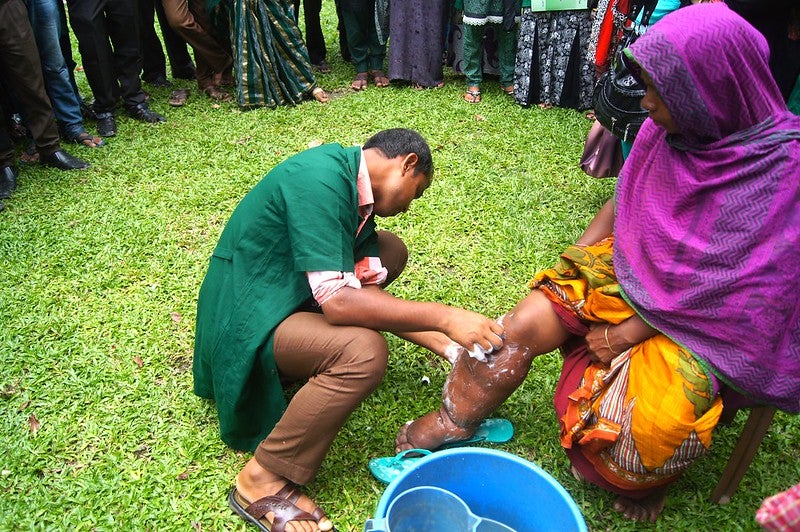How Bangladesh eliminated lymphatic filariasis
Millions of doses of prophylaxis treatments and a comprehensive database of lymphatic filariasis patients helped Bangladesh eliminate the neglected tropical disease

Over the past two decades, Bangladesh has eliminated the neglected tropical disease (NTD) lymphatic filariasis, which had been a major public health challenge for the country. At its height, about 70 million people – about half the country’s population – across 34 of the country’s 64 districts were at risk of contracting the disease, also known as elephantiasis.
To stop its spread, health leaders in 2001 launched one of the first – and most ambitious – national programs to eliminate the disease, which is caused by parasitic worms transmitted by mosquitos. The disease causes painful, disfiguring, and disabling swelling, usually in the lower limbs.
The program included what became the largest transmission assessment survey for lymphatic filariasis in the world. At its high point, the survey included testing a total of 136,080 primary school-aged children in 2,464 schools using rapid diagnostic tests.
The program also included two other key components: repeated mass drug administration through door-to-door distribution to more than 35 million people and treatment for the more than 40,000 people who had already been infected in 2,000 community clinics.
In all, more than 150 million prophylaxis treatments were distributed by health workers and community volunteers. Some districts received more than six rounds of medication.
Treating those already infected required training more than 8,000 community clinic staff members to identify those with the disease. Then, to track their treatment, the country created one of the world’s largest and most comprehensive databases of lymphatic filariasis patients. The database allowed health leaders to identify morbidity hotspots and adjust the package of care.
In a WHO statement, Dr. Poonam Khetrapal Singh, Regional Director WHO South-East Asia, who has been prioritizing ending neglected tropical diseases in the region, said: “Bangladesh’s achievement is commendable and follows strong political commitment, tireless efforts by health authorities, partners and the communities. It is also a result of innovative approaches and meticulous implementation of elimination strategies.”
As of 2021, 36 million people were estimated to be living with lymphatic filariasis and another 883 million were believed to be at risk of infection across 45 countries in Asia, Africa, the Western Pacific and parts of the Caribbean and South America.
Bangladesh is the 18th country to have eliminated lymphatic filariasis as a public health problem.
The world has been making remarkable progress against neglected tropical diseases in general. A total of 49 countries have eliminated at least one NTD and more than 700 million people receive treatment for an NTD each year.
For more on the subject:
How can we help you?
believes that the quickest path to improving health outcomes to identify positive outliers in health and help leaders implement lessons in their own countries.
With our network of in-country and cross-country partners, we research countries that have made extraordinary progress in important health outcomes and share actionable lessons with public health decisionmakers.
Our research can support you to learn about a new issue, design a new policy, or implement a new program by providing context-specific recommendations rooted in Exemplar findings. Our decision-support offerings include courses, workshops, peer-to-peer collaboration support, tailored analyses, and sub-national research.
If you'd like to find out more about how we could help you, please click . Please consider so you never miss new insights from Exemplar countries. You can also follow us on Twitter and LinkedIn.
